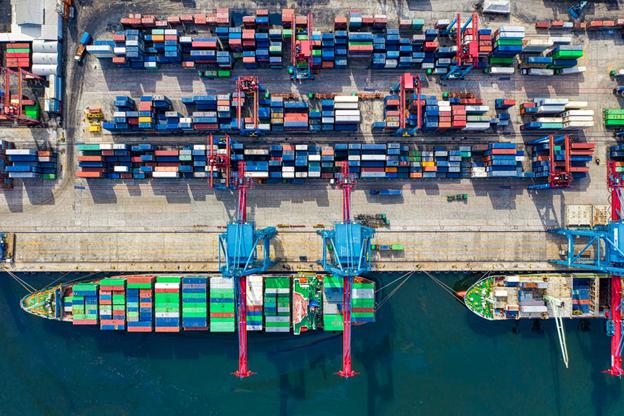Container Transport: everything you need to know
- Written by News Company

If you look watchfully at any picture of the container on the vessel, what would you see? Probably most parts of the ship covered with rectangular boxes of different colors. But they do not stand out from each other, right? Though, these shipping containers transport stuff from one place to another. No matter most of the transport containers look the same but their usage may vary.
In this article, we will learn about container transport and everything you need to know about it.
In the Maritime sector, the shipment of goods internationally depends on container transport. These are made according to some internationally recognized standardized ways that can transport goods from one country to another without being opened. But now the standardized containers have changed the goods transport industry. The good can be transport to anywhere by using rail, roads, and shipment; one can adopt the most convenient way. Container shipping plays a fundamental role in the economy and this structure shipment one of the necessities of trading. This good standardization has helped a lot in increasing efficiency. The economy scale when transporting more than $3 tons of goods each year, boom. On a container vessel to work proficiently and to have a full grip on container operation, this is essential for deck officer and crew to have sound expertise about the container and everything associated with it.
But how this transport system came into being and what were the causes that helped in creating this industry, we will talk in this article:
History of Container Transport
The modern container shipping industry is going to celebrate its 64th anniversary in 2020. Right from the first cruise, this method of transporting goods grew gradually. And in just 6 decades this container transport industry has carried about 60% of the goods via ships through the world.
The idea of shipping goods through containers is not completely novel based, but it is derived from a combination of rail and horse transport. This kind of transportation was taken place in England back in 1792, where small boxes were used to shift goods from one place to another. The US govt had used small containers during World War II; this proved the efficient means of supplying goods.
Back in 1995, one of the trucking businessmen named Malcolm McLean bought a steamship company. He had an idea of transporting the entire truck with the cargo. He had imagined that it would be much easier to put all the stuff inside a single container and ship it to the other place without creating a mess. This is how this journey started; people started using transporting goods with the same cargo with minimum interruption. These transportation modes bring massive benefits for international trade, by reducing transport costs, damage to goods and get rid of theft issues.
The distribution chain is simple since the goods remain inside the container from the start and keep safe until it reaches the end customer.
Types of Shipment Containers
Container shipments are categorized according to the final recipients;
Full container load
FCL is when the transported goods should be received by a single receiver despite the weight and volume of the goods. This full container load is generally preferable for those who have a huge amount of goods to be transported for a single heir.
Less Container Load
The partial load container filled with various goods in a single container, this is termed as LCL. This is also an international ISO term, this helps in transporting a lower volume of goods. This is a good option if someone is thinking of starting a trade business.
Containers to be shipped may vary in structure, dimension, the material used in manufacturing, etc. there are a variety of container types are used to meet the requirement of shipping good from one part of the world to the other.
Some of the most common container types are listed below:
Dry storage container
Dry storage containers are the most commonly used ones these days. These containers are designed in various dimensions which are approved by ISO standards. Dry storage containers are made for shipping dry stuff. They are available in different sizes; 10 ft., 20 ft. and 40 ft.
Flat rack container
Flat rack containers are simple storage containers with collapsible sides. These sides can be folded to convert it to a flat rack that can ship a variety of goods to be transported.
Open top container
To ship materials of any altitude easily, this open-top container is used. The top of this container is convertible; one can remove it to adjust the materials in these containers.
Tunnel container
Tunnel containers are made with doors on both sides, these type of containers are tremendously useful in loading and unloading of goods quickly.
Refrigerated ISO containers
The refrigerator containers are temperature controlled that are constantly regulated carefully for a lower temperature. These containers are used to transport fruits, vegetables and other edible over long distances.
Insulated or thermal containers
These are the containers that come up with a temperature and it is supposed to maintain a high temperature.
Tanks
Tank containers are used for transporting liquid materials, and these are the containers widely used by the shipping industry all over the world. The tanks are made of anti-corrosive materials that ensure their long life and ensure the protection of the materials it carries.
Cargo storage roll container
This transport container is made of strong wire mesh which allows their easy movement. They are used for transporting the stacks of goods, available in a wide range of colors.
Half Height Containers
This kind of container is half the height of the full size of containers, they are mostly made of steel. Half-height containers are used to transport goods including coals, stones, and other products. They are designed to help easy loading and unloading of the goods.
Car Carriers
These containers are particularly designed for shipping cars or vehicles over a long distance. Car carriers again come with a collapsible side that helps the vehicle fit securely inside the container.
How Transport Containers are made?
Containerization is not supposed to ensure the safety of the cargo but also advance and enhanced the carrying capacity. This results in building different types of transport containers that can be reliably used for worldwide trading.
Transport containers are made out of steel, aluminum, fiber polymer or sometimes combination of all with hinged doors, with different sizes depending on the capacity. These shipping containers have ridged walls to the top and bottom dimensions and welded well.
You can see 20 feet to 40 feet of container available in the market.
Conclusion
There is a wide range of transport containers used according to the goods transported. There are very hard and fast rules for this transportation industry that are supposed to be implemented in any case. In 1961, the ISO started regulating properly the standard size and dimension for all containers.
Manufacturer packed their goods into the container and they handled it to the container shipping companies. Then those goods were unpacked from the ships and loaded to the trucks or train so they can reach their final destination. Refrigerator, tank, flat or open tops containers are extensively used in the world after the Second World War.
Hence the container transport services are important to the world trade, no matter you need to buy leather goods from Australia or art supplies from china, the economical way is nonetheless but shipping goods via sea.





